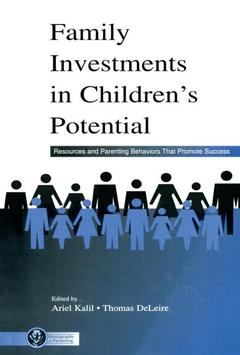Family Investments in Children's Potential Resources and Parenting Behaviors That Promote Success Monographs in Parenting Series
Coordonnateurs : Kalil Ariel, DeLeire Thomas

The papers in this volume bring together a cross-disciplinary mix of researchers--developmental psychologists, evolutionary biologists, economists, anthropologists, and sociologists--working on the common theme of investments in children. The interdisciplinary conceptual framework adopted by this collection of papers is loosely built around the idea that there are two broad dimensions of parental investments. These include resources (e.g., income, wealth) on the one hand, and behaviors (e.g., parental instrumental support and parental activities that promote warmth, socialization, and cognitive stimulation) on the other. Believing that parental investments yield a "return" in improved child and young adult outcomes, the papers discuss how parents differ in terms of the resources they have available to invest, the choices parents make, the behaviors they engage in, and relevant policy and program interventions.
More specifically, core questions addressed by the authors include: Why do some families invest while others do not and are differential investment patterns related to biology, economics, or social factors? What constitutes a successful "investment portfolio?" How are "investments" measured and/or characterized? Are different investments interchangeable, compensating, or off-setting? Given a set of resources, why are some families able to make more effective investments in child outcomes? How well do these investments affect outcomes for children and for these children as young adults? Can interventions or public policies help families build assets or become "better" investors in their children's potential? Developing a better understanding of what investments matter, when they matter, and how resources can be successfully invested in children's potential is key to shaping efficient interventions and social policies. Knowledge of how parents invest and what strategies are effective may help policies which seek to further empower and enable parental involvement and choice for their children.
Contents: M.H. Bornstein, Series Foreword: Monographs in Parenting. Preface. R.H. Bradley, R.F. Corwyn, "Family Process" Investments That Matter for Child Well-Being. J.M. Neiderhiser, D. Reiss, Family Investment and Child and Adolescent Adjustment: The Role of Genetic Research. R.T. Michael, Family Influences on Children's Verbal Ability. R. Dunifon, G.J. Duncan, J. Brooks-Gunn, The Long-Term Impact of Parental Organization and Efficiency. M.J. Guralnick, Family Investments in Response to the Developmental Challenges of Young Children With Disabilities. A.J. Fuligni, H. Yoshikawa, Investments in Children Among Immigrant Families. S. Lundberg, E. Rose, Investments in Sons and Daughters: Evidence From the Consumer Expenditure Survey. K.M. Ziol-Guest, A. Kalil, T. DeLeire, Expenditure Decisions in Single-Parent Households. K.A. Magnuson, G.J. Duncan, Parent Versus Child-Based Intervention Strategies for Promoting Children's Well-Being. J. Waldfogel, A Cross-National Perspective on Policies to Promote Investments in Children.
Date de parution : 05-2013
15.2x22.9 cm
Date de parution : 07-2004
15.2x22.9 cm
Thèmes de Family Investments in Children's Potential :
Mots-clés :
Personal Consumption Expenditure Deflator; Household Public Goods; Antisocial Behavior; Dummy Variables; Time Parents; Parental Investments; Welfare Reforms; Larger Families; Home Visiting Programs; Nonshared Environmental Influences; GE Correlation; Child’s Test Score; Passive GE Correlation; Direct Government Provision; Parent Child Transactions; Adolescent Adjustment; Clean Home; OLS Standard Error; Hm Treasury; Parent Management Training Programs; Children’s Positive Social Behavior; Children’s Human Capital Development; NLSY Data; Poorer Child Health Outcomes; Married Heads



